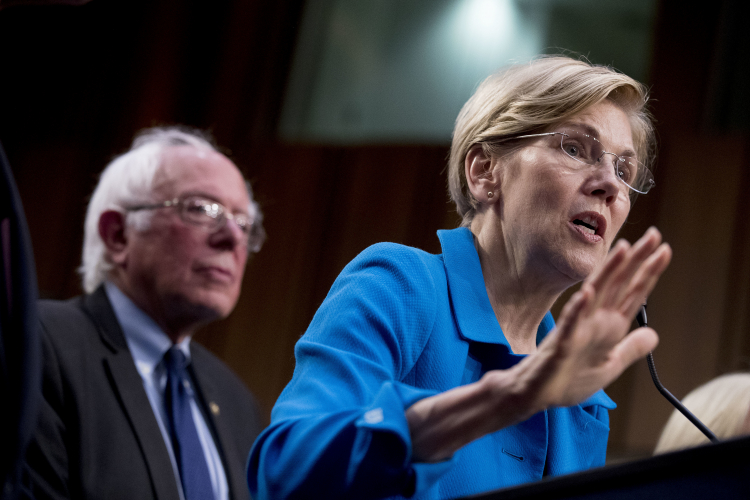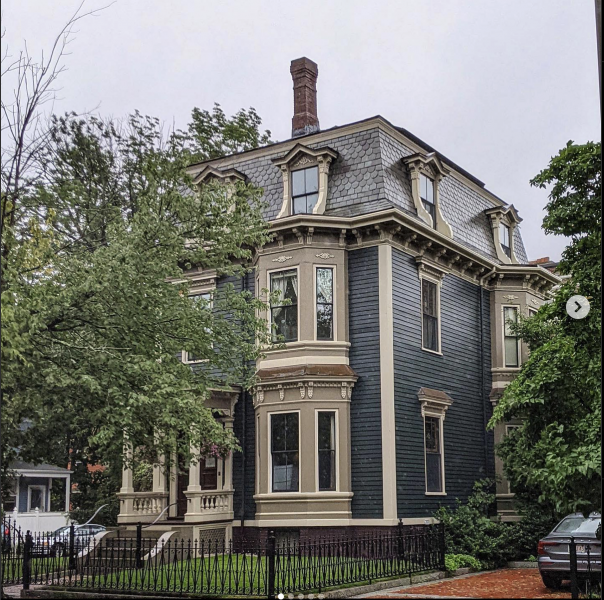When Sen. Elizabeth A. Warren recently traveled to the Big Apple to endorse New York City mayoral candidate Zohran Mamdani, she was asked if overt socialism is really the best model for Democrats to adopt. “You bet,” she replied in her signature folksy style.
The Boston lawmaker wasn’t just jumping on the sudden trendiness of socialism three-and-a-half decades after its near-extinction. With fellow Senate traveler Bernie Sanders, Warren has been a catalyst for moving her party to the left since her first campaign in 2012.
She and Sanders are, in many ways, the godparents of the self-avowed Democratic Socialists such as Mamdani and Alexandria Ocasio-Cortez, who are providing the youthful energy for the Democrats in the Trump era.

As Warren’s attacks on Wall Street and the wealthy are gaining even wider traction among liberals – a recent Gallup poll found 66% of Democrats have a positive view of socialism – the apparent contradictions between her public economic positions and private financial decisions are receiving new scrutiny, particularly as the one-time presidential candidate appears to be testing those waters again.
Charity Doesn’t Begin at Home
Financial records examined by RealClearInvestigations show that Warren has hardly followed the path of socialism in her personal finances. Start with the redistribution of wealth. Warren tirelessly bashes the “selfish” and “greedy” rich for not paying their “fair share,” and demands the government step in and redistribute their income to the poor. But charity does not always begin in the Warren home.
While Warren hauls in nearly $1 million a year, she donated less than 3% of her household income to charity in 2024, according to her tax returns. This is much less than the charity of the Obamas, for instance, who typically donate more than 20% of their earnings to the needy and philanthropic causes, and low for the average American in her income bracket, studies show. The average millionaire donates more than twice her share.
It also appears that Warren opens her pocketbook wider when she’s running for national office and under a bigger media microscope.
The $26,669 in charitable deductions Warren reported on her tax returns last year pales in comparison to the $81,858, or 9% of income, she reported as she launched her campaign for the White House in 2020.
And the outspoken Democratic leader keeps her own tax burden down while calling for higher taxes on “millionaires and billionaires.”
Records show Warren is not averse to taking maximum advantage of provisions in a tax code she denounces as unfair. She has, for example, written off used articles of clothing on her taxes and has had to correct past returns for inflating the value of those items. She’s also written off thousands of dollars in used books – and even in-flight WiFi to expense down business income. And she would exempt herself from her proposed “Ultra-Millionaire Tax,” which levies a surtax on those with a net worth above $50 million.
With a net worth of at least $8 million (with estimates as high as $12 million), Warren has benefited handsomely from free market capitalism – even as she has spent most of her career in the public and educational sectors.
Fat Cat Investments

Despite her frequent complaints that “the wealthiest 10% of U.S. households own 84% of American-held shares” of stock, she has invested the bulk of her money in stocks and bonds managed by Wall Street investment funds. These accounts are valued at between $1.9 million and $6.8 million, according to her most recent Senate financial disclosures, filed in April. (Values are given as ranges in the disclosure reports that members of Congress are required to file each year.)
Although Warren has rarely traded individual stocks, records show the mutual funds where she has parked her millions – Vanguard and TIAA-CREF – hold a number of companies in industries that Warren has demonized, including Big Oil, Big Tech, and Big Pharma. Through these funds, for example, Warren has invested in Apple, Amazon, and NVIDIA; Exxon and Shell; Wells Fargo; Goldman Sachs; Monsanto; Johnson & Johnson; and even NewsCorp – the owner of conservative Fox News and the New York Post.
Nevertheless, Warren has ripped “fat cat bankers” at Wells Fargo for preying on minority homebuyers and customers with “predatory” rates and “junk” fees, and also for “screwing” their own employees. She even demanded the Federal Reserve revoke Wells Fargo’s status as a financial holding company over “abusive and unlawful” practices.
Warren has called for regulators to break up tech giants Amazon and Apple, which she claims are running monopolies. “I’m sick of freeloading [tech] billionaires” who “roll over everyone,” she recently said.
Warren has described Exxon as a “bad actor” that contributes to global warming. She’s even accused the energy giant of “corporate perjury” by publicly denying its alleged role in warming and producing “fake research” to “mislead the American people about climate change.”

The senator has also slammed Exxon for “imposing massive price increases on Americans [sic] families,” arguing “this corporate greed is inexcusable.”
Environmental activist groups have called on her chosen retirement fund, TIAA, to divest from Exxon, along with the rest of its more than $78 billion in oil, gas, and coal assets, according to a recent estimate by the Institute for Energy Economics and Financial Analysis. They argue the fund is using contributions from investors like Warren to “destroy communities and the environment.”
Last year, Warren bashed Donald Trump for capitulating to the oil industry. “Donald Trump has a deal for Big Oil: if they raise $1 billion and send him back to the White House, he’ll gut environmental protections and roll back Joe Biden’s progress in fighting climate change,” she asserted on X. “It’s corruption, pure and simple. And it would be a disaster for our planet.”
Exempting Some Millionaires
Slamming the president’s “Big Beautiful Bill” earlier this year, Warren complained, “Trump’s tax cuts stand to benefit (the) highest income earners.”
She would know – she’s one of them. The $919,583 in household income Warren reported on her 2024 tax return she filed jointly with her husband puts her in the top 1% of highest-earning Americans. The year before she entered the Senate, Warren reported earning $616,181.
The lawmaker’s base Senate salary of $174,000 accounts for just one-fifth of the total income she reported to the IRS. The rest comes from book royalties, dividends, capital gains, earned interest, retirement income, and her husband Bruce Mann’s salary as a tenured Harvard professor.
The Senate is often described as a Millionaire’s Club, and she fits right in: Her $8 million net worth would rank her as the 18th wealthiest member of the Senate, according to the Center for Responsive Politics. Warren’s net worth has risen each year since she was first elected to the Senate in 2012, while the median wealth of senators overall has declined, according to the think tank.
Although Warren is just one of many millionaires in Congress, government watchdogs note her wealth is at odds with the stridency of her class-warfare rhetoric.
“Elizabeth Warren poses as the champion of the underdog, but her policies strip middle- and lower-income Americans of opportunities to advance their lot and build wealth,” said John Berlau, director of finance policy at the Competitive Enterprise Institute in Washington, referring to her calls for more taxes and financial red tape. “By pursuing policies that keep others from moving up, Sen. Warren has emerged as an unlikely champion of the existing 1%.”
Warren did not reply to requests for comment.
Critics note that several of Warren’s former staff members have moved on to positions in the sectors she decries. In 2023, she declared, “The abuse of the revolving door is appalling,” particularly in the financial sector, which she claims is “rigged to help the wealthy and well-connected.”
But records show her own office has served as a revolving door for the banks. For example, Wally Adeyemo, who served as her chief of staff when she was standing up the Consumer Financial Protection Bureau, went on to work as a senior adviser at investment giant BlackRock. At least six other Warren staffers who worked in her Senate office have worked as lobbyists, records show. In addition, several of her senior campaign aides have worked on K Street.
“There is a history of a revolving door of Warren staffers and protégés at the Consumer Financial Protection Bureau taking jobs at big Wall Street firms, such as BlackRock,” Berlau said.
Restrictive Neighborhoods

Home ownership is also key to wealth-building, but zoning restrictions often price the working class out of homes. Warren has fought against so-called NIMBY (“not in my backyard”) rules and has fiercely advocated for building more affordable housing in cities.
She even backs Mamdani’s “social housing” proposal to let the New York state government seize private properties and convert them into public housing.
However, Warren has chosen to live in affluent neighborhoods in Boston and D.C. that are heavily zoned to exclude the construction of new housing units and price out the average homebuyer.
Public financial statements do not disclose the 76-year-old legislator’s real estate holdings, but other records show she owns at least two homes valued at more than $5 million. Her primary residence is located in the leafy Avon Hill section of Cambridge, Mass., which has enforced a century-old zoning system of minimum lot sizes, minimum parking requirements, floor area ratios, limits on units per building, and height restrictions.
The restrictions have yielded a housing shortage in the city that has driven up the value of existing homes – including Warren’s 1876 Victorian mansion, which has risen eightfold to an estimated $4 million since she bought it in 1995. Records show she and her husband owe no mortgage on their nearly 4,000-square-foot home, which features three stories, high ceilings, marble mantels, hardwood floors, and a four-car garage.
The median price for a home in Cambridge now tops $2.2 million.
“The astronomical increase in the value of Warren’s home, and home prices in Cambridge more generally, has not happened in a vacuum,” said Scott Van Voorhis, a Boston real estate analyst. “The city’s special blend of upscale NIMBYism and restrictive zoning laws and regulations kept new house, condo and apartment construction to a trickle at best, even as demand for living in the city increased leaps and bounds.”
Though the Cambridge city council earlier this year loosened its zoning ordinances to permit more housing across the city, Warren’s neighborhood remains largely exempt from reforms.
That’s because Avon Hill is a conservation district further regulated by the Cambridge Historical Commission. Records show Warren’s street and home are located within the historic district, which protects old Victorians from being torn down for multifamily housing. That makes her neighborhood the ultimate safe NIMBY zone.
“Nothing has been built [in her neighborhood] for decades beyond the occasional mansion upgrade,” Van Voorhis noted.
Warren clearly understands there is a housing supply problem in Boston. In July, she helped shepherd the ROAD to Housing Act through the Senate, which, among other things, would provide grants to communities that change their land-use rules to make it easier to build new housing units.
“We have a real problem here in Massachusetts that we simply don’t have enough housing,” Warren explained to the Boston Globe, noting the state is about 200,000 units short of what is needed. “If we don’t start building more housing here, the housing crisis will continue to intensify.”
But when it comes to her own neighborhood – one of the least affordable in the state – she remains silent. Cambridge council members noted they didn’t hear “a peep” from Warren when they were recently debating zoning reforms to deal with the city’s growing housing affordability crisis.
In 2013, when Warren bought her home in Washington, D.C., she also happened to select an area of the capital city where zoning restrictions have entrenched the status quo. Valued at more than $1 million, her condo is in the trendy Penn Quarter section of D.C., which is a historic area protected by land-use rules.

Dubious Identity Politics
Most famously, Warren’s personal decisions seem at odds with the left’s leavening of traditional socialist positions with identity politics. Before moving to the Senate, Warren was a tenured professor at Harvard with a lucrative salary. Although the school denies that her claims to Native American ancestry influenced their decision to hire her, she and the administration trumpeted her diverse background.
Warren also listed herself as a racial minority in a legal directory distributed by the Association of American Law Schools and was listed as a Native American in federal forms filed by Harvard Law School.
When she launched her political career in 2012 and released a memoir, “A Fighting Chance,” Warren described her alleged “Native American roots” as a Cherokee. Henry Holt & Company paid her a $525,000 advance for the book, which became a national bestseller that still earns her royalties.
She also helped publish a cookbook, “Pow Wow Chow,” exploiting the myth of her native American lineage.
Warren took in $430,000 a year as a tenured Harvard Law professor by claiming a Native American heritage – even as she has railed against whites appropriating minority culture or pretending to understand minority experiences. But, as she ramped up her run for the White House, Warren responded to persistent challenges of this claim by taking a DNA test. In late 2018, her campaign maintained it showed “strong evidence” of Native American ancestry dating back generations.
When that failed to quiet her critics, Warren basically had to acknowledge that the test revealed that she is as little as 1/1024th Native American, making her less of that ancestry than the average white American. She also eventually apologized to the Cherokee Nation in 2019. The year before that admission, however, she lectured others during her Senate campaign about stolen valor: “It is wrong and cowardly for people to make fraudulent statements in order to receive distinctions that they have not earned. We need to ensure that no one can benefit from making false claims and steal the true valor of the courageous.”
“If there ever were a genuine case of cultural appropriation, Sen. Warren is guilty of it,” said Gad Saad, a business professor at Concordia University. “She literally appropriated Native American culture as her own by constructing a false narrative about her ancestry.”
“And yet,” he added, “she benefited for several decades from this false narrative both in her academic and political career.”
Saad and others who have closely followed her career suggest the progressive senator appears to have a “good for me, but not for thee” ethic when it comes to her own personal ambitions. Though she’s carefully groomed a reputation as a fighter for the “have-nots” against the “haves,” the record shows that, outside the spotlight, she has often pursued her own interests and followed the path of the haves.




